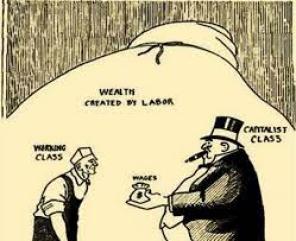“Digestion takes something more than a good stomach,” Karl Marx wrote.
In a June 28 presentation on economics organized by the Maine Democratic Socialists of America, Howard Engelskirchen and Carin Dunay unpacked Karl Marx’s analogy to the situation facing people under capitalism. Just as we have the capacity to digest food, humans also have the capacity to produce what we need for survival — but in each case, something external is needed. We cannot digest without food, and we cannot produce the necessities for survival without raw materials, land, tools — what Marx called the means of production.

The young Karl Marx
Dunay, a librarian, explained that under capitalism, most people with the capacity to produce have been stripped of the means of production, “as if they sat to eat without food on the table.” Engelskirchen, a retired professor of law and philosophy, described how masses of people came to be propertyless in his earlier article for Pine and Roses, referring to a history of “expropriation, theft, and dispossession throughout the globe.” As a result, “[a]ccess to tools and land and raw materials can only be gained by permission of another, to whom my work and its products then belong.”
These owners of our work and products are capitalists, who dictate the terms for how the rest of us do the work of sustaining human society. Capitalists exploit this position by forcing workers to do more than the socially necessary work for collective survival. Workers are compelled to do the surplus labor that creates profits for the capitalist.
After exploring the details of how labor exploitation operates, Engelskirchen and Dunay contrasted the plight of workers under capitalism with a socialist vision of “working people taking control of the conditions of production, democratically and participatively.” In socialism, the goal of production is not capitalists’ profits, but “human flourishing.” Quoting Marx, Engelskirchen stated that “Socialist
s build a society where ‘the full and free development of every individual forms the ruling principle.’”
Approximately twenty people attended the interactive online presentation, members of the general public and of Maine DSA alike. Participants peppered the presenters with questions on topics ranging from automation to supply and demand curves, from the history of accumulation to Modern Monetary Theory. The full video recording is available online.
The economics presentation was part two of a four-part socialism “crash course” series organized by Maine DSA’s Political Education Committee. The next session, focusing on oppression, will be held via Zoom on July 26th at 7:00 pm. Prospective participants can RSVP here.
Andrew Milne is a poverty lawyer representing seniors in the Lewiston-Auburn area and rural western Maine. He is the current chair of Maine DSA’s Political Education Committee.




